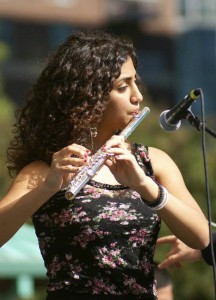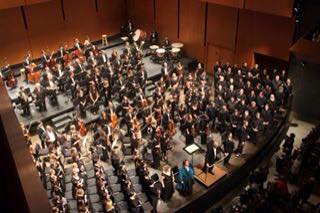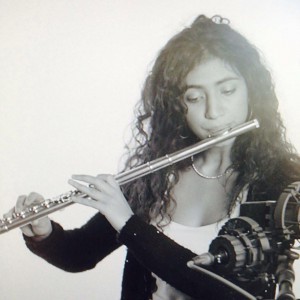
The last dregs of sunshine filter through the thinning green leaves of the trees at Bard College Berlin’s cafeteria as I sit down on the mossy grass with Mais Hriesh, a third year exchange student from the Bard campus in Annandale-on-Hudson, to find out more about her story. The first time we met she had told me she was Palestinian, double-majoring in Human Rights and Music. She had told me she played the flute. I remember nodding, interested, but not imagining all she concealed behind her casual words. It was only later that I found out about her earnest dedication to her music and the opportunities her talent has given her, including the opportunity to study at the Bard Conservatory.
Just as I imagine many (sometimes reluctant) children are acquainted with their first musical instruments through their parents’ encouragement, we can thank Mais’ parents for her involvement with music.
“My parents really like music. My mom always wanted to learn a musical instrument, but she never really had the opportunity because she was one of nine siblings,” she explains to me. “When her and my dad first got married, my dad got her a piano as a wedding present, and she started to take piano lessons.”
“Since I was really young they encouraged me and my siblings to get into music. So when I was eight years old I started playing the guitar, and then I got my electric guitar, and I was really into rock music.” She says this with a grin. “Then, when I was 13, I joined the Polyphony foundation, and I started playing the flute, and I started getting into classical music.”
“What’s that?” I ask, referring to the organisation she had mentioned. I know enough words to guess that the name is derived from roots meaning “many” and “sound”. Like polygon combined with symphony: Polyphony. “It’s a foundation that aims to bridge the divide between Arab and Israeli musicians,” she explains.
Mais was born in Nazareth, the biggest city in Israel. Though she carries an Israeli passport, she considers herself Palestinian. She was educated in Nazareth her whole life until she went to college in New York. Coming from South Africa, a country that is still fraught with racial tension, I think I can imagine the “gap” between Arab and Israeli that she describes. It is through the Polyphony foundation that Mais is able to study at Bard, the main cofounders of which are based in New York.
“What role has music had in your education and in your life?” I ask as she sips at the unpredictable cafeteria coffee. The birds insist on participating in the conversation, their voices rising above ours.
“It gave me opportunities that I could never even dream of.”
“Like going to Bard?”
“Like going to Bard, but also travelling around the world already when I was 14. I would play a lot of concerts in the US, in Europe — in Germany, Spain, Austria. It helped shape my personality — being exposed to all these cultures, all these peoples.” A thoughtful pause. “It made me more sure of what I wanted to study.”
“Why BCB?” I ask.
“Mostly because of Berlin,” she confesses to me. “I came here mostly because of music — to have the opportunity to study with different flute teachers and to experience the city. But I also didn’t want to lose the liberal arts aspect [that the school offers].”
“And how do you find the balance between music and classes?” Though not a musician myself, I can guess at the dedication required to perfect such an art. Mais confirms the work involved is more than sufficient.
“My best option is to wake up really early and practice.” I nod in understanding. I have often counted her as among the first to arrive to breakfast in the mornings, already alive to the world long before other sleepy classmen file in.

“It’s hard. It’s a lot of work. But the key always is to go to bed early and to wake up early, and to calculate your time. I have to-do lists everyday: how many hours to spend on this, or this.”
“Have you ever questioned your dedication to music?”
“Of course! Every day.”
Her answer surprises me.
She explains:“Because you spend such a long time with it that sometimes you wonder ‘am I doing it right, am I not doing it right?’ It’s not consistent at all. Sometimes you wake up and it’s great, and other times you wonder…”
The situation is made more difficult by the fact that she is majoring in human rights as well as music. She tells me that “everyone just puts a lot, a lot of work into music, because it needs a lot of dedication. Sometimes I wonder ‘can I really do it with another major?’”
With all the work involved, I ask her why she continues with it.
Her words are earnest as she tells me:“It’s too beautiful to quit! I don’t think I can quit it.” She goes on: “I think every musician has those struggles… or maybe not every musician. Maybe it’s just me being too romantic about it.”
As well as being intellectually challenging, her music affects her physically. Imagine holding your arm up in one position for hours on end, then again the next day… and the next. For years.
“I have tennis elbows from it,” she admits. You must put more than emotion into it: “you put a lot of yourself into it.”
With all the work she puts into her music, I wonder if she has time to pursue other passions. Again, she surprises me with a confession:“I’m obsessed with everything that has to do with the Spanish language.” And with a laugh, she tells me: “I watch a lot of Telenovelas. That’s my guilty pleasure.”
She also enjoys hiking, and played basketball in high school. A friendly Sunday afternoon soccer game with other students on the BCB campus proved that her soccer moves are more than decent. And, when she needs a break from practicing and working, she treats herself to concerts in Berlin.
“I came here because I really like the city. I really like Berlin. I like what it offers. It’s very alive. I think it could give a lot to me. I go to concerts once a week, at least.”
She lets me in on her concert strategy. “Sometimes I just go to the Berlin Philharmonic hall, and sometimes people leave in the intermission and they give me their tickets for free.” Personally, I am very excited at this prospect.
About her aspirations for the future, she tells me, “I definitely want to continue with music in the future. I want to combine both music and human rights. I want to go back home eventually, and do work back home.”
She continues. “I was really lucky to have this opportunity that a lot of people like me didn’t have. I think I owe it to my community to go back and to try to give even a little bit – to at least try to give.” Particularly, she would like to continue working with the Polyphony foundation. Later, sitting down to write this, Google defines polyphony for me as “the style of simultaneously combining a number of parts, each forming an individual melody and harmonizing with each other.” She explains the word “Polyphony” to me much better than Google could. “It means many voices that work together, and different voices that work together. Even though we have different backgrounds, different views, different political beliefs, different religions, we are able to work together and stand together on one stage and play the same music, and try to present it in the best way possible.”
Though I personally have yet to hear Mais play, she assures me that she will try to put something on informally with some of the other musicians on campus for anyone interested in attending. I, for one, definitely count myself amongst this number!
[hupso_hide]

